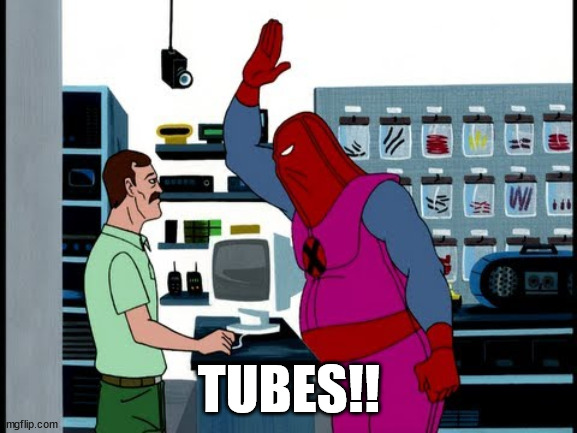I'm pushing 40 and while I know about vacuum tubes I definitely don't remember seeing these bad boys around
Nostalgia
nostalgia noun nos·tal·gia nä-ˈstal-jə nə-, also nȯ-, nō-; nə-ˈstäl- 1: a wistful or excessively sentimental yearning for return to or of some past period or irrecoverable condition also : something that evokes nostalgia
Rules for Nostalgia Lemmy Community
1. Respectful Nostalgia Share nostalgic content and memories respectfully. Avoid offensive or insensitive references that may be hurtful to others.
2. Relevant Nostalgia Posts should focus on nostalgic content, including memories, media, and cultural references from the past. Stay on topic to preserve the nostalgic theme of the community.
3. Source Verification If you share nostalgic media or content, provide accurate sources or background information when possible.
4. No Spamming Avoid excessive posting of similar nostalgic topics to keep content diverse and engaging for all members.
5. Positive Discussions Encourage positive discussions and interactions related to nostalgic topics. Respect different viewpoints and memories shared by community members.
6. Quality Content Strive to post high-quality content that sparks nostalgia and meaningful conversations among members.
7. Moderation Guidelines
-
Respectful Behavior Treat fellow members with kindness and respect. Harassment or disrespectful behavior will not be tolerated.
-
Appropriate Content Only Ensure all content aligns with the nostalgic theme and community guidelines. Inappropriate or offensive material will be removed.
-
Engagement and Participation Engage actively with posts and discussions. Constructive feedback and contributions enrich the community experience.
By adhering to these rules and guidelines, we can create a welcoming and enjoyable space to relive nostalgic moments together. If you have any questions or suggestions, feel free to reach out to the moderators. Thank you for sharing your nostalgia responsibly!
I'm pushing 60 and these were around in my childhood. I never saw anyone use it because everything was solid state by then.
67 here. I played around for hours with old tubes at the closest "variety" store by me. Couldn't afford new tubes even when I found a bad one - I was weird, and it was something to do.
Occasionally I'd see an actual TV repairman use it, otherwise it just sat there.
I suppose these would be a sweet novelty in a music store. No idea if tubes are in anything these days outside of amps.
I used to work at a TV repair shop, and the owner owned a lot of these in the surrounding 6 states. In the 80s, he sold them all to a German company for something like 1M, and the German company turned around and resold them for something like 6M 3 months later.
Cleaning out the shop one day, we found a bunch of the old tubes. I kept some and mocked up a display but never finished it.

Why are they worth that much?
He owned a lot of them and sold a lot of tubes every month, generating revenue. Not sure how much, but with solid state becoming more popular, the amount kept going down, so he sold. Not sure who the German company sold to, but I assume they went to a country that was behind the curve on technologies and still had a large number of tube electronics in service.
There is still old equipment that needs repair, and radio shops restoring old equipment for audiophiles...so I can see these holding value
Memory Unlocked. We had moved into a house that had an old 60s tube radio built into the wall, it was broken, but my dad went through steps to sort out the issues and pulles a few tubes out. I recall the door with the chart of valve types.
The radio/amp sounded great once fixed. It had these two luninous stripes that you watched as you dialed in a radio station. It was a tuning aid. you tried to get the lines as close as possible to know you had matched a frequency, but if you over dialed the stripes dissapated, and you had to scroll back a bit.
I was in Georgia (the country) a few years back and visited a flea market, where, to my delight, several guys were selling a lot of Russian made tubes. I was inclined to buy a few, but didn't have an opportunity to research the models on the spot, plus the hassle of taking back glass tubes in my luggage was eventually not worth it.
Still, it's endearing to know that they're still around, apart from maker projects and overpriced retro hardware.
I have an old (probably '60s) hifi amp. It's awesome. Replaced the selenium rectifier with silicon, replaced a few caps, and put fresh tubes in it.
It sounds...basically the same as modern solid state stuff to my untrained ear. It's pretty cool that in a sense we "solved" the problem of amplification back then. Most of the speakers of the day were probably complete crap by today's standards (unless you had something upscale like a pair of AR-3s), but a well designed amplifier from the era holds up well.

I remember using these. You didn't have to write down which tubes went where because the store had a sheet of stickers in number pairs, one for the tube, and the matching sticker for the socket.
There are also testers in carry-cases.
And there are companies that sell tube amp kits with very detailed instructions, some based on the Dynaco specs and designs from the 50s-70s. Repro parts are still made. Dynaco sold Dynakits back then.
The tubes are mostly Chinese or Russian made, possibly some in Ukraine.
Thing to remember is they run very high voltages and they can self destruct when one's back is turned.
This vendor has been around for decades and has a supporr forum... http://tubes4hifi.com/
That’s so cool
